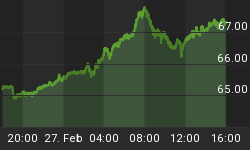Below is an extract from a commentary posted at www.speculative-investor.com on6th January 2005.
The coming deflation scare
During each of the past four years there has been a deflation scare, although last year's scare was certainly minor in comparison with the ones that occurred during 2001, 2002 and 2003. There is, however, a huge difference between a deflation scare and a genuine deflation threat. In fact, in the current environment DEflation scares are necessary in order to keep the INflation going, and if they didn't occur naturally the Fed would have to create them. This is because inflation only ever confers any 'benefits' when it is not widely recognised as a problem. Deflation scares, therefore, are useful in providing cover (justification) for the next round of inflation.
The reason for reiterating the above view now is that if the various markets do roughly what we expect them to do then another big deflation scare is probably on the cards for 2005-2006. In particular, if a) gold and gold stocks experience normal mid-cycle corrections over much of this year, b) the stock market peaks during the first quarter of this year and then declines into the next 4-year cycle bottom (due in the second half of 2006), and c) commodities trend lower between the second quarter of this year and the third quarter of 2006 in synch with reduced global growth expectations and a strengthening US$, then deflation fears will once again begin to dominate the financial landscape. However, it's a very good bet that the end result of the 2005-2006 deflation scare will be the same as the result of every other perceived deflation threat of the past 70 years -- more inflation, one of the main effects of which will be currency depreciation.
So, while it will be important not to have a closed mind and totally dismiss the possibility that the US will experience genuine deflation (a sustained contraction in the total supply of money and credit) at some point over the next few years, it will be critical not to get conned by market action into believing that sharp price corrections in the things that generally do well during periods of inflation (commodities, for instance) are foretelling the onset of deflation. The financial markets have appeared to forewarn of deflation literally dozens of times since the mid-1930s and their record is unblemished by success. There are two reasons for this, one being that sharp corrections in prices are a normal occurrence during inflation cycles (the effects of inflation are never linear or uniform) and the other being that central banks are extremely adept at continuing the inflation.
Gold and Deflation
In a monetary system such as the one we have right now -- a system in which there is no official link between gold and the reserve currency -- it is unlikely that gold would be a beneficiary of GENUINE deflation. Instead, during a sustained period of genuine deflation the gold price would probably hold up better than, say, the prices of copper or silver, but it would almost certainly fall. The reason is that although gold is money, debts cannot be directly paid using gold. Rather, someone who owned gold and needed to pay off some debts would have to sell the gold to obtain the dollars (or other national currency) required to make the debt repayments.
This is not something that long-term holders of gold bullion should lose any sleep over, though, because the probability of getting anything more than a deflationary blip at any time over the next several years is extremely low. The far more likely outcome is that the next deflation scare will provoke the Fed into backing away from any pretense of inflation fighting and moving towards an overt inflation-promoting stance similar to the one employed during 2002-2003 (during more normal times the Fed uses a covert inflation-promoting approach). And when the Fed -- an organisation with the ability to create an unlimited quantity of dollars -- sets its sights on higher inflation then higher inflation is what we are likely to get.
In summary, we expect that there will be a downturn in the gold price in parallel with the next deflation scare and that the downturn in the gold price will magnify the scare because many people will incorrectly conclude that the market is warning of things to come. We also expect that this deflation scare will set the scene for the next multi-year advance in the gold price due to the predictable reactions of the Fed and other central banks.















